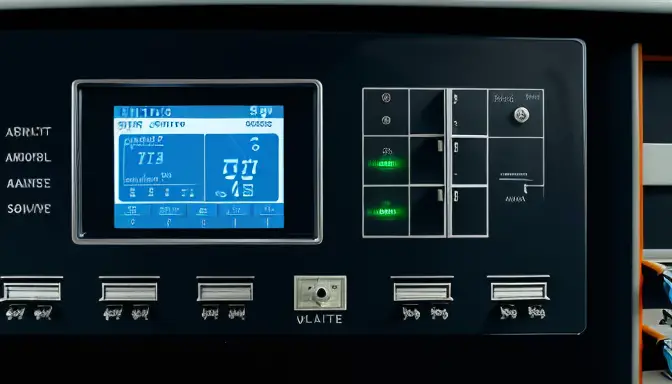Unit voltage alarms can be a real headache for boat owners, disrupting your smooth sailing experience and potentially causing safety hazards. To avoid these alarming situations, it’s crucial to implement preventive measures and stay ahead of any voltage issues that may arise. By understanding the root causes of unit voltage alarms and taking proactive steps, you can ensure a reliable electrical system on your boat.
- Regular maintenance practices play a key role in preventing unit voltage alarms. By conducting routine checks and inspections, you can identify and address potential voltage fluctuations before they escalate into alarm-triggering situations.
- Checking battery connections is a fundamental maintenance task that can help in avoiding voltage issues. Ensuring that battery terminals are clean, tight, and free of corrosion is essential for maintaining a stable voltage supply.
- Monitoring battery health is another critical aspect of preventing unit voltage alarms. Keeping track of your batteries’ condition and replacing old or failing batteries in a timely manner can significantly reduce the risk of voltage fluctuations.
Understanding Unit Voltage Alarms
Unit voltage alarms are crucial components in a boat’s electrical system, serving as warning signals for potential voltage irregularities. These alarms are designed to alert boat owners and passengers about fluctuations in voltage levels that could lead to electrical issues or failures. Understanding how unit voltage alarms operate is essential for maintaining the safety and functionality of the vessel.
When a unit voltage alarm is triggered, it indicates that the electrical system may be experiencing overvoltage or undervoltage conditions. Overvoltage can damage sensitive electronics on board, while undervoltage can lead to power shortages and equipment malfunctions. By comprehending the significance of unit voltage alarms, boat owners can take proactive measures to prevent these situations.
One effective way to grasp the operation of unit voltage alarms is to familiarize oneself with the specific voltage thresholds that trigger the alarms. Different electrical components on a boat may require varying voltage levels to function optimally, and understanding these requirements can help in interpreting alarm signals accurately.

Regular Maintenance Practices
Regular maintenance practices are crucial for ensuring the smooth operation of your boat’s electrical system and avoiding unit voltage alarms. By conducting routine checks and implementing preventive measures, you can prevent potential issues that may arise during your sailing adventures.
One essential maintenance task is checking battery connections regularly. Loose or corroded connections can lead to voltage fluctuations, triggering alarms and disrupting your voyage. By inspecting and securing these connections, you can maintain a stable electrical flow throughout your boat.
Monitoring battery health is another key practice to prevent voltage alarms. Keeping track of your batteries’ condition and replacing old ones in a timely manner can help ensure a consistent power supply onboard, reducing the risk of unexpected voltage drops.
In addition to these tasks, investing in voltage regulators can provide added protection for your electrical system. These devices help stabilize voltage levels, safeguarding sensitive equipment and preventing damage from fluctuations in power.
For more comprehensive guidance and assistance, consulting with marine electricians is highly recommended. These professionals have the expertise to identify potential issues, offer tailored solutions, and ensure the overall safety and efficiency of your boat’s electrical setup.
Lastly, developing an emergency response plan is essential in case of voltage alarms. By outlining clear steps and procedures to follow during such situations, you can effectively address any electrical issues that may arise, ensuring the safety of both passengers and the vessel.
Checking Battery Connections
When it comes to checking battery connections on your boat, attention to detail is crucial for ensuring a safe and reliable electrical system. Loose or corroded connections can lead to voltage fluctuations and potential alarms, disrupting your sailing experience. To avoid such issues, follow these essential steps:
- Inspect all battery terminals for signs of corrosion or damage.
- Tighten any loose connections to ensure a secure fit.
- Clean the terminals using a wire brush to remove any corrosion buildup.
- Apply a thin layer of dielectric grease to protect the connections from future corrosion.
- Check the battery cables for any fraying or wear and replace if necessary.
By regularly checking and maintaining your battery connections, you can prevent voltage alarms and enjoy a smooth sailing experience without any unexpected disruptions.
Monitoring Battery Health
When it comes to ensuring the smooth operation of your boat’s electrical system, monitoring battery health is crucial. By keeping a close eye on your batteries, you can prevent unexpected voltage fluctuations and potential alarms that may disrupt your sailing experience. Here are some essential tips for effectively monitoring battery health:
- Regular Inspections: Make it a habit to visually inspect your batteries for any signs of damage or corrosion. Check for leaks, cracks, or bulging, as these can indicate underlying issues that may affect voltage stability.
- Testing Voltage Levels: Use a multimeter to measure the voltage levels of your batteries regularly. This will help you track any fluctuations and identify if a battery is losing its charge capacity.
- Recording Performance: Keep a log of your battery performance, including charging times, discharging patterns, and any anomalies observed. This data can help you detect early signs of battery degradation.
- Replacing Old Batteries: As batteries age, their capacity to hold a charge diminishes. It is essential to replace old or failing batteries promptly to maintain a stable voltage supply on your boat.
By incorporating these monitoring practices into your routine maintenance, you can proactively address battery health issues and minimize the risk of voltage alarms during your maritime adventures.
Investing in Voltage Regulators
Investing in voltage regulators is a crucial step in ensuring the stability and protection of your boat’s electrical system. Voltage regulators play a vital role in maintaining a consistent voltage supply, preventing fluctuations that could lead to alarms and potential damage. By installing voltage regulators, you can safeguard sensitive electronics and equipment on board, prolonging their lifespan and performance.
Here are some key benefits of investing in voltage regulators:
- Stabilizing Voltage: Voltage regulators help stabilize the voltage output, ensuring a steady and reliable power supply to all components.
- Protecting Electronics: By regulating voltage levels, these devices protect sensitive electronics from power surges and fluctuations, reducing the risk of damage.
- Improving Efficiency: A stable voltage supply enhances the overall efficiency of the electrical system, optimizing performance and reducing energy consumption.
Whether you have a small recreational boat or a larger vessel, investing in quality voltage regulators is a smart decision to safeguard your electrical system and enjoy a worry-free boating experience.

Consulting with Marine Electricians
When it comes to dealing with voltage alarms on your boat, consulting with marine electricians can be a game-changer. These professionals are equipped with the knowledge and expertise to diagnose and address electrical issues effectively. By seeking their guidance, you can ensure that your boat’s electrical system is in top-notch condition, minimizing the risk of voltage fluctuations and alarms disrupting your sailing experience.
Here are some key reasons why consulting with marine electricians is crucial:
- Specialized Knowledge: Marine electricians specialize in boat electrical systems, making them the best-suited professionals to tackle voltage alarm concerns.
- Diagnostic Skills: These experts can conduct thorough inspections to identify potential issues before they escalate, saving you time and money in the long run.
- Custom Solutions: Marine electricians can provide tailored solutions to address your specific voltage alarm problems, ensuring optimal performance of your boat’s electrical setup.
Emergency Response Plan
When facing voltage alarms on your boat, having an is crucial to ensure the safety of everyone on board. Here are some key steps to include in your plan:
- Immediate Assessment: When an alarm goes off, quickly assess the situation to identify the source of the voltage issue.
- Isolate the Problem: Safely isolate the affected area or equipment to prevent further damage to the electrical system.
- Notify Crew and Passengers: Inform everyone on board about the situation and provide clear instructions on safety measures to follow.
- Activate Emergency Equipment: Ensure that emergency equipment like fire extinguishers and life jackets are easily accessible and ready to use if needed.
- Follow Emergency Procedures: Implement pre-established emergency procedures to address voltage alarms effectively and efficiently.
Frequently Asked Questions
- What are unit voltage alarms?
Unit voltage alarms are warning indicators that notify boat owners of irregular voltage levels in the electrical system, signaling potential issues that need attention.
- How can I prevent unit voltage alarms on my boat?
To avoid unit voltage alarms, it is essential to conduct regular maintenance checks on battery connections, monitor battery health, invest in voltage regulators, and consult with marine electricians for professional guidance.
- Why is monitoring battery health important?
Monitoring battery health is crucial to ensure a stable voltage supply on the boat. Old or faulty batteries can lead to voltage fluctuations, triggering alarms and potentially causing electrical system malfunctions.
- What should I include in my emergency response plan for voltage alarms?
Developing an emergency response plan should involve clear procedures for addressing voltage alarms, ensuring passenger safety, and taking necessary actions to safeguard the vessel during electrical emergencies.
- What Happened to Bluewater Yachts? The Inside Story - May 31, 2024
- Upgrade Your Boat’s Water Pump to the Mach 5 - May 30, 2024
- Upgrade Your Boat with the Big Stuff Stuffing Box - May 30, 2024


